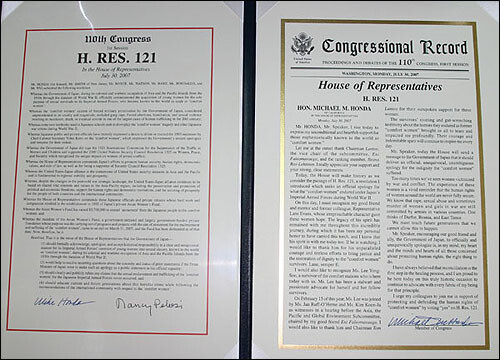hankyoreh
Links to other country sites 다른 나라 사이트 링크
Bill related to comfort women passed in US congress

By Park Hyun, Washington correspondent
The US House of Representatives passed a bill on Jan. 15 with an attached document urging the US Secretary of State to encourage the Japanese government to address the issues contained in the House’s “comfort women resolution” from 2007. This is the first time that the comfort women issue has been officially addressed in legislation passed by the US Congress.
The 2014 spending bill for the US government passed on Wednesday after being put to a vote before the entire house. The document about the comfort women is included in a report that addresses spending for the State Department. The section draws attention to the July 30, 2007 passage of House Resolution 121, which dealt with the comfort women issue, and strongly urges the Secretary of State to encourage the Japanese government to resolve the issues that are contained in that resolution.
The comfort women resolution (H. Res. 121), which was adopted in 2007, was sponsored by Rep. Mike Honda (Democrat), who is of Japanese descent. The resolution calls on the Japanese government to acknowledge its responsibility for the past, on the Japanese prime minister to officially apologize, and on Japan to follow the recommendation of the international community by teaching the post-war generation about these issues. Along with Honda, Rep. Steve Israel (Democrat) also played an instrumental role in seeing that a document about the comfort women was attached to the bill.

The comfort women document is likely to have a considerable political impact, pushing the US executive branch to renew diplomatic efforts to bring about a change in the attitude of the Japanese government. The handbook to the bill states that the Federal Government must abide by the reports attached to the spending bill in its implementation of the bill. Since the US executive branch must report to Congress at the end of the year about the extent to which it implemented the provisions of the spending bill, it will inevitably feel pressure to carry out Congress’s requests. The bill will become law as early as Jan. 17, after passing the Senate and being signed by President Barack Obama.
In a meeting with lawmaker Jeong Cheong-rae from the Korean Democratic Party, who visited Washington on Wednesday, Honda said that the passage of a bill is a message from the House of Representatives to the US executive branch that it should take aggressive action to resolve the comfort women issue. Honda said that the US executive branch has the most influence on the Japanese government and that this bill is intended to bring about a shift in Japan’s attitude.
Honda explained that the document about the comfort women that was attached to the bill represents “report language,” to use the congressional term, which the House of Representatives used to send a direct message to the executive branch. “Our message to the Obama administration is that it should strongly urge Japan to admit its responsibility for the past and to apologize for that past,” Honda said.
Analysts close to the US Congress believe that the bill will have the effect of putting pressure not only on Secretary of State John Kerry but also on President Barack Obama. A Congressional source who was involved in the legislation suggested paying attention to the procedure for passing the bill. It is only after the bill is ratified by the Senate and signed by President Obama that it gains legal force. “If the US President signs the bill, he will also feel pressure to implement the law since he is the President, the person who whose signature is on the law,” the source said on condition of anonymity.
Honda took the lead in adding the comfort women section to the bill reportedly because of his disappointment about Japan’s reaction to the passage of the resolution in 2007. Rather than expressing its remorse, Japan instead took steps to deny its past actions. “For the Japanese prime minister to refuse to make a sincere apology and to pay his respects at the Yasukuni Shrine is like rubbing salt in the wounds,” Honda said on Wednesday. “It is important for Japan to make a sincere apology and to take responsibility for what it did in the past.”
“It is also important for Japan to use its textbooks to record what happened in the past and why an apology was made so that future generations can know about this,” he added.
Honda had been mulling over the question of including a comfort women section in the spending bill for the past year, said Kim Dong-suk, executive director of the Korean American Voters’ Council (KAVC), an advocacy group for Korean Americans. KAVC worked with Honda in 2007 and played a leading role in passing the comfort women resolution.
“When some members of the House of Representatives started saying that we need to pass another comfort women resolution last year, Honda said that now is the time when we need to make sure that the previous resolution is actually implemented,” Kim said. “We are seeing those ideas bearing fruit now.”
The passage of the resolution also has considerable importance for diplomacy between South Korea and Japan that takes place in Washington, which is the main stage for international diplomacy. The bill was passed while Japan was dedicating all its energy to appeasing the US after Japanese Prime Minister Shinzo Abe’s visit to the Yasukuni Shrine. Before it was passed, the Japanese government reportedly did not realize that a document about the comfort women was attached to the bill.
“The House of Representative’s comfort women resolution was symbolically important, but it was mostly a proclamation that ended with its adoption by the House of Representatives,” said a diplomatic source in Washington on condition of anonymity. “On the other hand, I believe that this bill will force the US administration to put political and diplomatic pressure on Japan to indicate its regret.”
“This clearly shows that Japan’s refusal to resolve the comfort women issue is being perceived by American politicians as a disregard of human rights, a universal human value,” the source said.
Please direct questions or comments to [english@hani.co.kr]

Editorial・opinion
![[Guest essay] The real reason Korea’s new right wants to dub Rhee a founding father [Guest essay] The real reason Korea’s new right wants to dub Rhee a founding father](https://flexible.img.hani.co.kr/flexible/normal/500/300/imgdb/original/2024/0423/8317138574257878.jpg) [Guest essay] The real reason Korea’s new right wants to dub Rhee a founding father
[Guest essay] The real reason Korea’s new right wants to dub Rhee a founding father![[Column] ‘Choson’: Is it time we start referring to N. Korea in its own terms? [Column] ‘Choson’: Is it time we start referring to N. Korea in its own terms?](https://flexible.img.hani.co.kr/flexible/normal/500/300/imgdb/original/2024/0423/3617138579390322.jpg) [Column] ‘Choson’: Is it time we start referring to N. Korea in its own terms?
[Column] ‘Choson’: Is it time we start referring to N. Korea in its own terms?- [Editorial] Japan’s rewriting of history with Korea has gone too far
- [Column] The president’s questionable capacity for dialogue
- [Column] Are chaebol firms just pizza pies for families to divvy up as they please?
- [Column] Has Korea, too, crossed the Rubicon on China?
- [Correspondent’s column] In Japan’s alliance with US, echoes of its past alliances with UK
- [Editorial] Does Yoon think the Korean public is wrong?
- [Editorial] As it bolsters its alliance with US, Japan must be accountable for past
- [Guest essay] Amending the Constitution is Yoon’s key to leaving office in public’s good graces
Most viewed articles
- 1[Column] ‘Choson’: Is it time we start referring to N. Korea in its own terms?
- 2Why Korea shouldn’t welcome Japan’s newly beefed up defense cooperation with US
- 3Senior doctors cut hours, prepare to resign as government refuses to scrap medical reform plan
- 4[Guest essay] The real reason Korea’s new right wants to dub Rhee a founding father
- 5[Column] The clock is ticking for Korea’s first lady
- 6Opposition calls Yoon’s chief of staff appointment a ‘slap in the face’
- 7Terry Anderson, AP reporter who informed world of massacre in Gwangju, dies at 76
- 8New AI-based translation tools make their way into everyday life in Korea
- 9Samsung barricades office as unionized workers strike for better conditions
- 10Korean government’s compromise plan for medical reform swiftly rejected by doctors